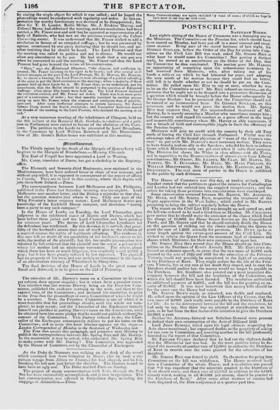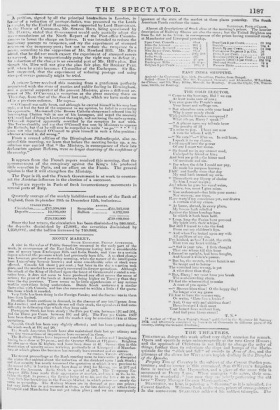The House of Commons met this day, at twelve o'clock.
The Speaker stated that the petitioners against the returns for Portarlington and London bad not entered into the required recognizances ; and the orders for taking those petitions into consideration were discharged.
Some conversation occurred between Mr. BAINES, Mr. AGLIONBY, Mr. HOME, and Mr. SPRING RICE, respecting the treatment of the N-gro apprentices in the West Indies ; which ended in Mr. BAINES promising to bring the subiect regularly before the House. The report on the Civil List Bill was brought up and agreed to; and the bill was ordered to be read a third time on Monday. Mr. CHALMERS gave notice that he should move the omission of the clause which fixed the charge of 10,0001. for Home Secret Service on the Consolidated Fund ; and Mr. GROTE said that he should certainly divide the House on the question of striking out the clause authorizing the Queen to grant the sum of 1,2001. annually for pensions. Mr. Reale spoke at some length against the extravagant amount of the Civil List. He wished to relieve the Queen from the enormous load of sinecures and abuses which Ministers, for their own purposes, laid upon her. Mr. SPRING RICE then moved that the House should go into Com- mittee on the Dutchess of Kent's Annuity Bill. Mr. GOCI.BCRN de- livered an elaborate speech, to prove that the two sums of 6,0001. each granted by the acts of 1825 and 1891 for the education of the Princess Victoria, could not possibly be considered in the light of an annuity to the Dutchess of Kent. They might endure for the life of the Prin- cess Victoria, but at any rate at her death they ceased, and in case the Dutchess should outlive her, the money would no longer be payable to the Dutchess. Mr. Goulburn also pointed out a most important dis- crepancy between the bill and the resolution of the Committee, on which the bill should have been founded. The resolution authorized an additional payment of 8,000/., and the bill was for granting an an- nuity of 80,0001. It was most important that money bills should be for the exact sum the House had voted.
Mr. SPICING RICE'S reply, as reported, was feeble and confused. He relied upon the opinion of the Law Officers of the Clown, that the two sums of 6,0001. each really were payable to the Dutchess of Kent for life. As to the discrepancy between the bill and the resolution, be had only to say, that there was no attempt at mystification on his part, as he had from the first declared his intention to give the Dutchess 30.0001. a year.
Neither the Attorney-General nor Solicitor- General were present to defend their own construction of the Acts of 1825 and 1831.
Lord JOHN RCSSELL relied upon his legal advisers respecting the Acts above mentioned ; but expressed doubts as the propriety of asking for one sum in Committee, and inserting another in the bill professedly founded on the report of that Committee. Sir EDWARD SCGDEN declared that be had not the slightest doubt that the Ministerial law was bad. In the most positive terms he de- clared the necessity of another vote of 12,0001. to authorize the Dutchess of Kent to receive now the sums granted for the education of her daughter.
Mr. SPRING Ftrce was forced to yield. So the motion for going into Committee on the bill was withdrawn. The House resolved itself
into a Committee of the whole House, and a resolution was passed
that " it was expedient that the annuities granted to the Dutchess of Kent should cease, and that a sum of •2•2001. in addition to the 8,0001.
already voted, making in all 30,0001. per annum, should be granted to the Dutchess of Kent." After some other matters of routine had been disposed of, the House adjourned at a quarter past two. . A petition, signed by all the principal booksellers in London, in favour of a reduction of postage-duties, was presented to the Lords le.r, eight, by the Earl of RADNOR, and supported by Lord BROUGHAM. In the House of Commons, Mr. SPRING RICE, being questioned by
ir. Hewes, stated that Geverntnent would only partially adopt the retee mendations of the Ninth Report of the Post-office Commis- sioners to lower the charge on letters. It was intended to reduce the fouroimity postage to twopence, and try the experiment of stamped covers on the twopenny post ; but not to reduce the twopence to a according to the suggestion of Mr. Rowland Hill. Mr. RICE adds re that he did not much expect the experiment of stamped covers to soceeed. He is unquestionably going the right way to defeat it ; for reduction of the .charge is an essential part of Mr. Hill's plan. But thou;;h kir. Rice will not give the plan fair play, Sir ROBERT PEEL will. Nthell he aemin becomes Chancellor of the Exchequer. Sir Ro- bert stiegested, that the experiment of reducing postage and using stumped covers generally might he tried.



























 Previous page
Previous page